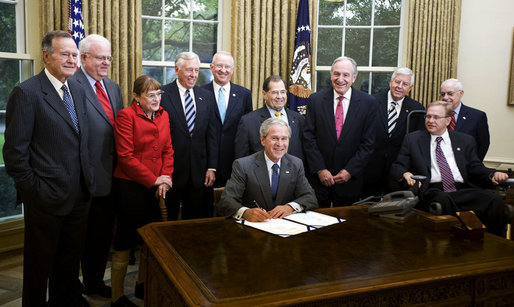Ben poses a good question: "Is it possible that Congress itself passes some sort of legislation that deals with these signing statements?"
Years ago, some lawmakers introduced legislation to curb signing statements in general. The bills never went far, in part because they had little chance of overcoming a presidential veto.
But it is possible to anticipate signing statements on an case-by-case basis. Leigh Ann Caldwell reports at NBC:
Faced with the probability of a presidential signing statement and uneasy about the process of handing out hundreds of billions of dollars of loans and grants to small and big businesses, Congress built into the legislation multiple oversight entities and requirements for transparency meant to protect against favoritism, fraud and fiduciary recklessness.
...
The president’s signing statement pertains to a newly created special inspector general for pandemic recovery responsible for overseeing the more than $400 billion of loans to big businesses by the Treasury secretary. The new position mirrors a special inspector general created to oversee the Troubled Asset Relief Program, or TARP, in the Wall Street bailout.
The president is responsible for appointing the special inspector general and the Senate has the responsibility to confirm. If the president fails to appoint an inspector general, Democrats are sure to complain that the president and the administration has something to hide.
...
Congress also created two other oversight boards, including one with similar responsibilities as the special inspector general. Although it doesn’t have subpoena power, a congressional oversight panel made up of five members will also oversee the big business fund run by Treasury and the Federal Reserve. Each congressional leader will appoint a member and the fifth member is agreed upon between Pelosi and Senate Majority Leader Mitch McConnell. The Treasury secretary and the Federal Reserve are also required to post companies that have been given loans within seven days on their websites.
Additionally, a committee of inspectors general from nine federal agencies, known as the Pandemic Response Accountability Committee, or PRAC, was given $80 million to audit and investigate the federal governmen'ts coronavirus response and implementation of all relief funds.

